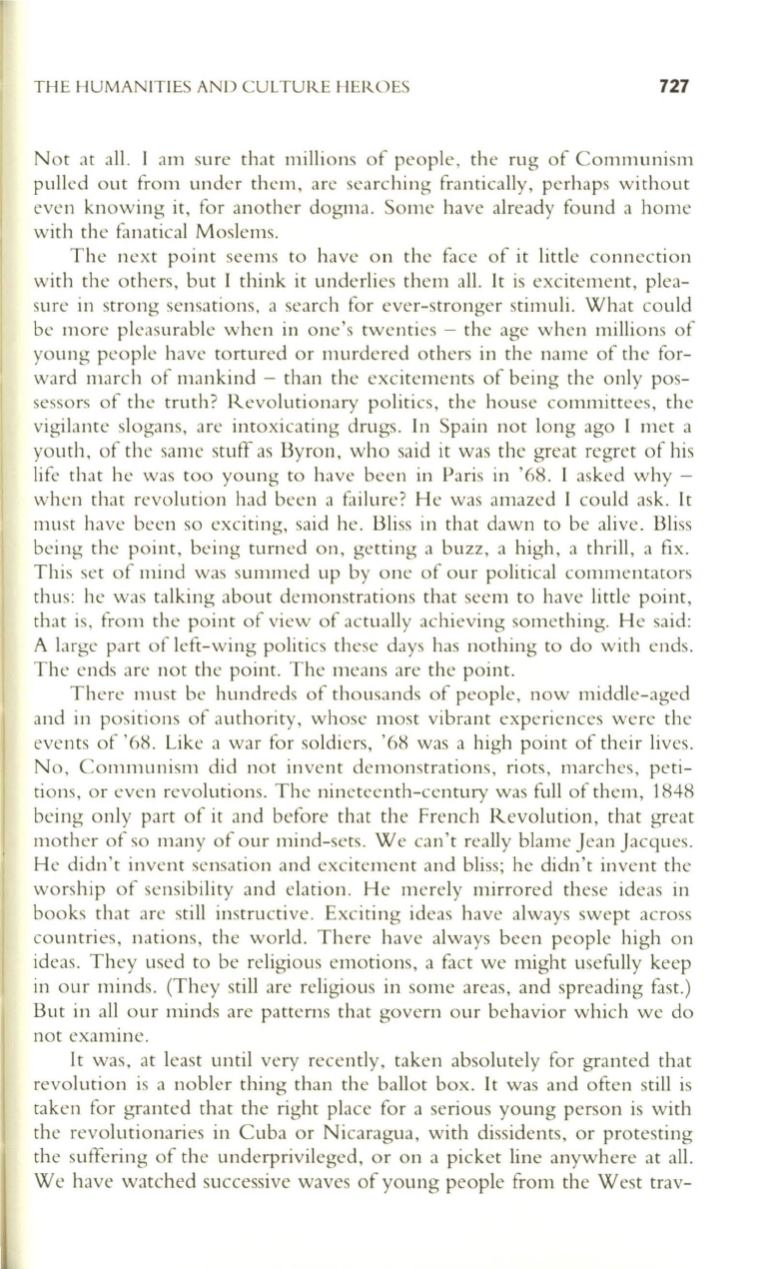
THE HUMANITIES AND CULTUR.E HEROES
727
Not at aiL I am sure that millions of people, the rug of Communism
pulled out from under them, are searching frantically, perhaps without
even knowing it, for another dogma. Some have already found a home
with the £lllatical Moslems.
The next point seems to have on the face of it little connection
with the others, but I think it underlies them aiL It is excitement, plea–
sure in strong sensations, a search for ever-stronger stimuli. What could
be more pleasurable when in one's twenties - the age when millions of
young people have tortured or murdered others in the name of the for–
ward march of mankind - than the excitements of being the only pos–
sessors of the truth? Revolutionary politics, the house committees, the
vigilante slogans, are intoxicating drugs. In Spain not long ago I met a
youth, of the same stuff as Byron, who said it was the great regret of his
life that he was too young to have been in Paris in '68. I asked why -
when that revolution had been a failure? He was amazed I could ask. It
must have been so exciting, said he. Bliss in that dawn to be alive. Bliss
being the point, being turned on, getting a buzz, a high, a thrill, a fix.
This set of mind was summed up by one of our political commentators
thus: he was talking about demonstrations that seem to have little point,
that is, from the point of view of actually achieving something. He said:
A large part of left-wing politics these days has nothing to do with ends.
The ends are not the point. The means are the point.
There must be hundreds of thousands of people, now middle-aged
and in positions of authority, whose most vibrant experiences were the
events of '68. Like a war for soldiers, '68 was a high point of their lives.
No, Communism did not invent demonstrations, riots, marches, peti–
tions, or even revolutions. The nineteenth-century was full of them, 1848
being only part of it and before that the French Revolution, that great
mother of so many of our mind-sets. We can't really blame Jean Jacques.
He didn't invent sensation and excitement and bliss; he didn't invent the
worship of sensibility and elation. He merely mirrored these ideas in
books that are still instructive. Exciting ideas have always swept across
countries, nations, the world. There have always been people high on
ideas. They used to be religious emotions, a fact we might usefully keep
in our minds. (They still are religious in some areas, and spreading fast.)
But in all our minds are patterns that govern our behavior which we do
not exam.ine.
It was, at least until very recently, taken absolutely for granted that
revolution is a nobler thing than the ballot box. It was and often still is
taken for granted that the right place for a serious young person is with
the revolutionaries in Cuba or Nicaragua, with dissidents, or protesting
the suffering of the underprivileged, or on a picket line anywhere at alL
We have watched successive waves of young people from the West trav-


